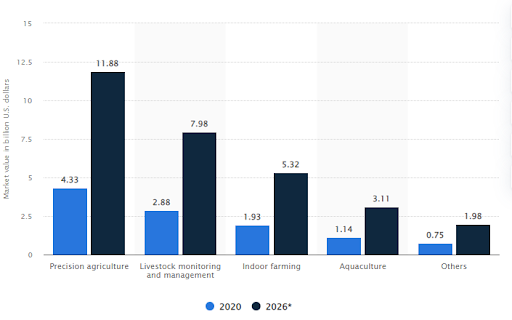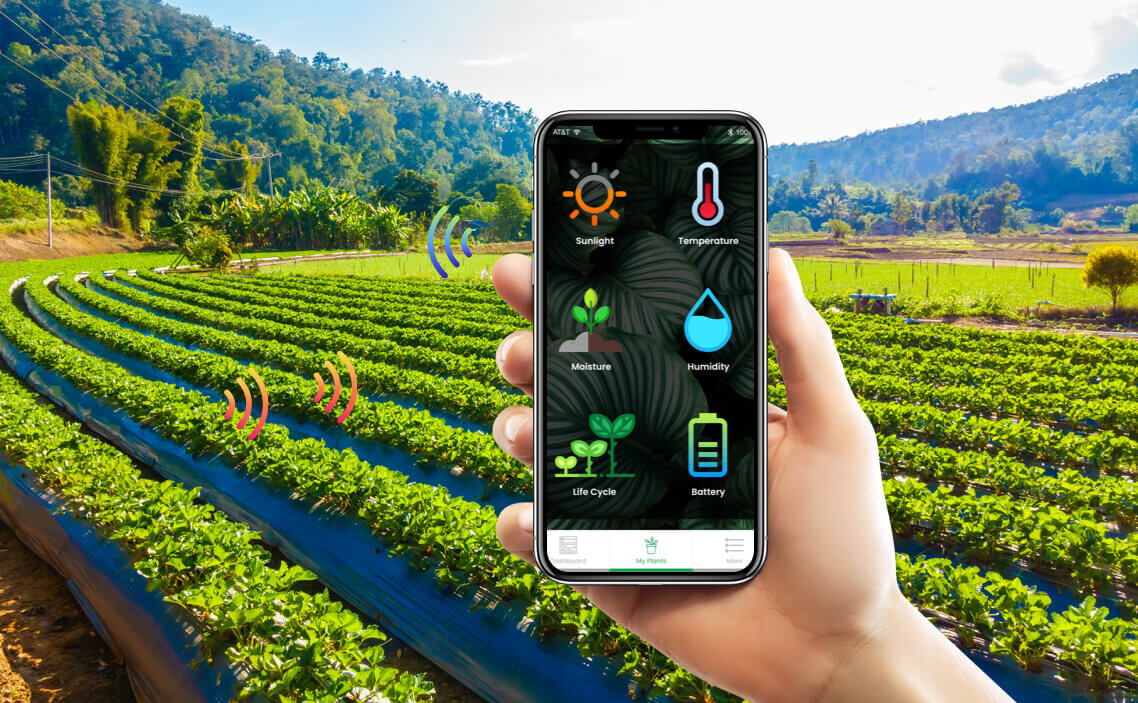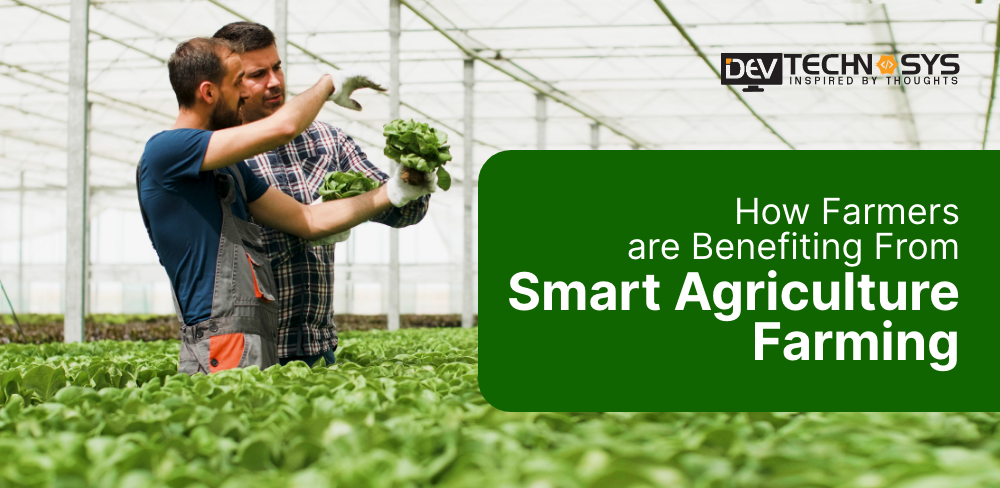Smart agriculture farming, also known as precision farming or digital farming, is a type of farming that uses advanced technologies such as sensors, drones, and GPS to optimize crop production. The goal of smart agriculture is to increase efficiency, reduce waste, and improve the overall sustainability of farming.
Many farmers are benefiting from using smart agriculture techniques, which can help them save money, increase crop yields, and improve the health of their crops. These benefits are significant in today’s challenging agricultural environment, where farmers face various challenges.
By using smart agriculture techniques, farmers can overcome these challenges and ensure the long-term viability of their operations. In this blog, we will discuss how farmers benefit from smart agriculture farming.
So let’s start with the blog.
Market Stats of Smart Agriculture Farming
Here are the current market stats of smart agriculture farming. Let’s have a look at them.

- The size of the worldwide smart agriculture industry is anticipated to increase from roughly 12.4 billion dollars in 2020 to 34.1 billion dollars by 2026.
- By 2022, Smart farming using IOT will dominate the agricultural technology market.
- By 2030, the value of the global market for autonomous tractors is anticipated to increase at a similar rate, reaching about $11.6 billion USD.
- It is anticipated that the market for precision farming will increase from 6.73 billion US dollars in 2021 to 14.44 billion US dollars by 2027.
- By 2026, it was anticipated that the growth of the world precision agriculture industry would have increased to $12 billion from about $4.33 billion in 2020.
- From 2021 to 2026, the size of the global farm management software and data analytics market is anticipated to increase with a CAGR of 17.47%.
- China’s smart agricultural market was projected to be worth about 62 billion yuan in 2020.
What is Smart Agriculture Farming?
Smart agriculture farming is a type of agriculture farming that utilizes advanced technologies, such as sensors, robotics, and data analysis. To improve the efficiency, sustainability, and profitability of farming operations. It involves using various technologies to monitor and manage crops, soil, and water and control pests and diseases. It allows farmers to make more informed decisions about their operations, leading to better use of resources and increased productivity.

Smart agriculture farming also incorporates the use of precision agriculture techniques, which involve using GPS and other technologies to precisely target the application of seeds, fertilizers, and other inputs. That results in more efficient use of these resources and reduced environmental impact.
Benefits of Smart Agriculture Farming to farmers
Now that you know what smart agriculture farming is, it is time to learn about the benefits of smart Agriculture software development farming to farmers. Let’s have a look at each of them.
1. Reduced Consumables
Conventional farming techniques sometimes lead to considerable inadequate and overuse of pesticides. By adopting the such technologies may minimize damage by remotely turning off specific sprinkler parts when the tractor approaches the edge. Also, alternative approaches are required for various situations.
2. Easier Reporting and Recording
With smart farming, duties are electronically transferable and recorded. You may ensure that all your documents and information are correct and relevant by streamlining the acquisition and transmission of information utilizing an FMIS. You may access historical information and manage document creation with just one tap.
3. Easier Financial Forecasting
The FMIS system automates all of this data simultaneously, making it simple to monitor the time projects take and the required fuel and labor, and the project budget. To avoid interruptions, the effectiveness and quality even make it possible to relay diagnostic information to major operators ahead of a need for authorized repair.
4. Enhanced Market Opportunities
By adopting smart farming techniques or agriculture software development services, farmers can access new markets and opportunities, such as the growing demand for organic and sustainable products.
5. Improved Efficiency
By using automation and other advanced technologies, farmers can streamline their operations and reduce the amount of time and labor needed for their crops.
6. Increased Fuel Efficiency
A project can be finished in fewer laps, requiring a vehicle to travel a less route overall by minimizing redundancies. Also, it saves not only a lot of time and but also fuel. Even a single pass reduction in cutting activities does have a long-term impact over several acres.
7. Increased Work Efficiency
Saving opportune time represents one of the best elements of smart agriculture farming. Autonomous guiding software is used by self-steering tractors to drive them along the way lines remotely. Also, farmers could save approximately 5% of their work using these self-steering farm machinery, which improves productivity significantly.
8. Improved Animal Welfare
With advanced technologies such as sensors and drone software development, farmers can monitor and care for their animals more effectively, leading to improved health and well-being.
Read more: How Much Does It Cost to Develop Farm Management Software?
9. Increased Sustainability
The sustainability of farming might be increased in a broad range of ways. It starts from cutting down on spraying waste to enhancing fuel efficiency.
Smart farming practices can help farmers reduce their carbon footprint and protect the environment. It can lead to more sustainable farming practices, benefiting the farmer and the community.
10. Improved Food Safety
With the use of smart farming techniques, farmers can monitor and control the quality and safety of their crops, ensuring that the food produced is safe for consumption. It can improve the reputation of the farmer and their products.
11. Enhanced Environmental Protection
Smart farming techniques can help farmers protect the environment by reducing their use of harmful chemicals and pesticides, conserving water, and reducing their carbon footprint.
12. Increased Yields
The health of the crops is impacted by excessive and under-spraying, which results in uneven sections of burned seedings and reduced-performance plants. Also, portion management enables producers to cultivate dependably even and nutritious crops while optimizing yield by removing over and underlaps.
13. Enhanced Market Opportunities
With enhanced market opporutnities and by adopting smart farming techniques farmers can access new markets and opportunities, such as the growing demand for organic and sustainable products.
14. Improved Soil Health
By using sensors and other technologies, farmers can monitor the health of their soil and make adjustments to improve its quality and productivity.
15. Improved Water Conservation
Smart farming allows farmers to monitor and control their irrigation systems, ensuring water is used efficiently and not wasted. It can save money on water bills and protect natural water resources. Hire dedicated developers from a renowned and experienced mobile application development company to build a smart agriculture farming app.
Read more: Top 7 Web Development Ideas to Start A Business in Middle East
16. Lower Driver Stress
Difficult tasks like spending long shifts, preserves clean lines while managing instruments. There are various approaches that Smart Agriculture farming can alleviate the pressures of everyday tasks.
However, Automatic Guiding helps to track straightly, allowing the operator to concentrate on both the task at issue and the execution. Thanks to Portion Management, the sprayer may be turned on and off without any assumption.
17. Reduced Use of Pesticides and Chemicals
Smart farming techniques can help farmers monitor and control pests and diseases, reducing the need for chemical pesticides and other harmful chemicals. It can improve the health of the crops and the environment.
Conclusion
smart agriculture offers numerous benefits to farmers. For instance, it allows for precise and efficient use of resources such as water and fertilizers, leading to increased crop yields and reduced costs. However, the use of technology also enables farmers to monitor and control their crops remotely, reducing labor costs and increasing efficiency.
It allows for more sustainable and environmentally friendly farming practices, ultimately benefiting the ecosystem’s overall health. Also it provides numerous advantages to farmers, helping them to improve their operations and increase their profits.
Now that we have provided you with all the information related to smart agriculture farming, it is time you must take assistance from an experienced and reputed mobile app development company in dubai that can develop a smart agriculture app for your business.
Frequently Asked Questions
1. How Much Does it Cost to Develop a Smart Farming App?
The cost of development for smart agriculture farming depends on various factors as follows:
- Application feature
- Application platform
- Location of the development team
A simple application development costs around $25,000 to $35,000, and an advanced application costs around $40,000 to $50,000.
2. Why Should Businesses Invest in Smart Farming App Development?
There are several reasons a business should invest in developing smart farming apps.
- Smart farming apps can help improve the efficiency and productivity of a farm.
- Smart farming apps can help reduce the environmental impact of agriculture.
- investing in developing smart farming apps can help a business stay ahead of the curve and differentiate itself from competitors.




















